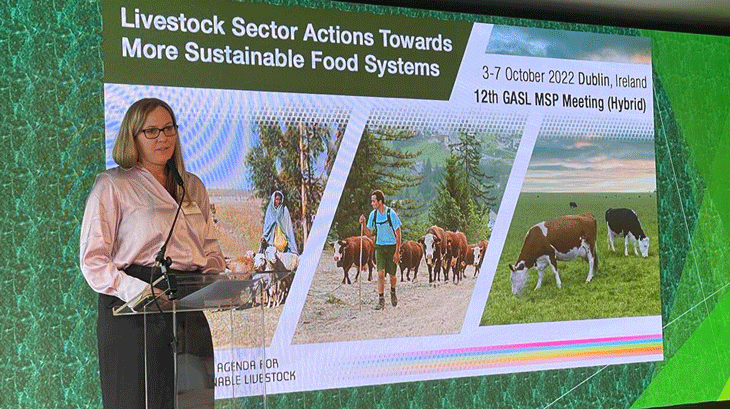MLA Carbon Neutral 2030 (CN30) Manager, Margaret Jewell, on the insights most relevant to Australian beef businesses shared at GASL

Caption: MLA’s Carbon Neutral 2030 (CN30) Manager, Margaret Jewell, was part of a delegation of Australian representatives to attend the Global Agenda for Sustainable Livestock (GASL) in Dublin last month.
On 7 October the 12th Multi-Stakeholder Partnership Meeting of the Global Agenda for Sustainable Livestock (GASL) wrapped up a week of valuable knowledge exchange and lively discussions about the actions of the livestock sector towards more sustainable food systems.
Almost 150 participants gathered in Dublin, including representatives of the Australian Beef Sustainability Framework’s Sustainability Steering Group (SSG).
Here, MLA’s Carbon Neutral 2030 (CN30) Manager, Margaret Jewell, shares the insights relevant to Australian beef businesses she picked up from this important global gathering.
Most interesting or surprising learning to come from the event?
The most interesting thing to come out of the event was the detailed knowledge and science underpinning the role of red meat plays in nutrition and society. Also, the stark difference in the challenges involved in making red meat production more sustainable in developing versus developed nations.
What did you learn that is relevant and could be impactful for the Australian beef industry?
There are a number of environmental assessment schemes, such as the Livestock New Page Environmental Assessment and Performance Partnership (LEAP) and the Global Livestock Environmental Assessment Model (GLEAM). We need to ensure that the way we do our measuring and reporting is reconcilable with these global schemes. The datasets will not be exactly the same because at the country level (versus global), they are more granular. But they still need to reconcile.
How does what we’re doing on the ground in Australia compare to what is happening in other nations?
It was clear that with our Beef and Sheep Sustainability Frameworks and the CN30 target, the Australian red meat industry is seen as leaders in how red meat can be produced sustainably. The work that we’ve been doing in Australia, and the progress we’re now able to demonstrate, are very impressive at the global level and we have a role in encouraging other red meat industries to set and progress towards targets.
In saying that, many countries are working on activities that are very similar to what we are doing in Australia. For example, the work being conducted by Teagasc at their research facilities and the Origin Green programme mirror the work we’re doing in reducing enteric methane emissions, storing carbon, and developing sustainability credentials.
The activities of most countries overseas are government-led, commonly known as ‘the stick’ approach. Individuals and agricultural sectors in heavily subsidised countries don't have as many choices as we do in Australia in how they approach sustainability. Rather, they introduce new practices into their enterprises based on what they can receive subsidies for.
In contrast, Australia is one of the least subsidised countries in the world when it comes to agriculture. Our sustainability, particularly methane emissions reducing activities are largely industry-led. Under CN30, we are encouraging Australian red meat producers to become aware of how minimising carbon wastage from their systems – for example by maximising carbon use efficiency – results in overall business efficiencies, which is good for their productivity, profitability, and long term sustainability. And, because we have been so proactive, our producers and other stakeholders are free to pursue opportunities that are best for their businesses.
What are people from other countries saying?
There was a lot of discussion about whether livestock numbers should be reduced in order to achieve global methane targets and country specific emissions reduction targets. Within the red meat industry and science community, we know this isn’t the case and we have a detailed understanding of the importance of red meat to human health, societies, and the environment. An overarching message coming from the meeting was the need for increased research and development to generate data and communicate scientifically underpinned evidence of the benefits of red meat, to combat the misinformation that is rampant in social media and even used in some policy making globally.
Another message was that there is a lot of work going into producing meat more sustainably in developed countries, but in developing countries the focus is on continuing to develop economic systems so producers can earn an equitable income from livestock production and be in a position to invest some of that income into improving their sustainability.
From what you heard, where are our greatest opportunities to take action towards more sustainable food systems?
In Australia, we already recognise that the greatest opportunity lies in investing more funding into developing cost-effective feed additives that safely and cost-effectively reduce emissions from red meat across the world. While we understand that methane from red meat is cyclical and less detrimental to the climate than methane produced from mining of gas and coal, reducing methane does have on-farm benefits to producers in terms of long-term sustainability and profitability. CN30 is focused on this, as well as improved diets, management, genetics, and carbon storage, and success will have enormous benefits for Australian red meat producers, as well as global societies.
However, sustainability isn’t just about the environment, there are important steps that need to be taken to ensure nutrition security across the globe, and there are opportunities for developed countries to assist more in ensuring that every person on the planet has enough red meat in their diet.
It is vitally important that governments are using peer reviewed science to underpin policy decisions, so another great opportunity is in increasing investment into research and development to ensure that the science has a voice and the global community continues to be able to produce, access, and consume red meat in a manner that protects our environment and our people.
More information
Contact:
Resources: